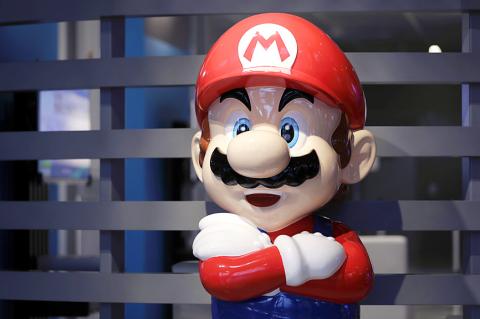The initial excitement surrounding Nintendo Co’s debut mobile game, Super Mario Run, appears to be wearing off.
The title, released on Dec. 15 for Apple Inc devices, was no longer the highest-grossing iOS app in any country as of Saturday, according to the latest data available from researcher App Annie.
A week earlier, it was the most profitable app in 49 nations. In terms of free downloads, it was still on top in 88 countries, down from a peak of 138 on Dec. 17.

Photo: Bloomberg
The drop in rankings could reflect problems with the app’s price: Super Mario Run can be downloaded for free, but users have to pay US$10 if they want to progress beyond the first three levels of the game.
That is a departure from the industry’s standard, where most mobile games can be played for free but encourage users to buy in-game items to speed up progress. Fans appear to prefer the latter and have lashed out at the lack of free content in Super Mario Run.
Another point of criticism has been the US$10 price tag, which many gamers have said is too high. At that level, only 1 percent to 2 percent of people who download the game will buy the full version, according to Apptopia Inc.
If the price was lowered to US$2, it could likely convert 3 percent to 4 percent. The researcher estimates the lower price would translate into revenue of about US$50 million for this month, versus about US$30 million at the current price.
Nintendo shares rose as much as 4.8 percent yesterday, perhaps because investors have digested most of the negative news.
The company’s shares slid 20 percent from Dec. 12 through last week as the game’s messy debut raised doubts about the company’s ability to execute its mobile strategy.

When Lika Megreladze was a child, life in her native western Georgian region of Guria revolved around tea. Her mother worked for decades as a scientist at the Soviet Union’s Institute of Tea and Subtropical Crops in the village of Anaseuli, Georgia, perfecting cultivation methods for a Georgian tea industry that supplied the bulk of the vast communist state’s brews. “When I was a child, this was only my mum’s workplace. Only later I realized that it was something big,” she said. Now, the institute lies abandoned. Yellowed papers are strewn around its decaying corridors, and a statue of Soviet founder Vladimir Lenin

UNIFYING OPPOSITION: Numerous companies have registered complaints over the potential levies, bringing together rival automakers in voicing their reservations US President Donald Trump is readying plans for industry-specific tariffs to kick in alongside his country-by-country duties in two weeks, ramping up his push to reshape the US’ standing in the global trading system by penalizing purchases from abroad. Administration officials could release details of Trump’s planned 50 percent duty on copper in the days before they are set to take effect on Friday next week, a person familiar with the matter said. That is the same date Trump’s “reciprocal” levies on products from more than 100 nations are slated to begin. Trump on Tuesday said that he is likely to impose tariffs

HELPING HAND: Approving the sale of H20s could give China the edge it needs to capture market share and become the global standard, a US representative said The US President Donald Trump administration’s decision allowing Nvidia Corp to resume shipments of its H20 artificial intelligence (AI) chips to China risks bolstering Beijing’s military capabilities and expanding its capacity to compete with the US, the head of the US House Select Committee on Strategic Competition Between the United States and the Chinese Communist Party said. “The H20, which is a cost-effective and powerful AI inference chip, far surpasses China’s indigenous capability and would therefore provide a substantial increase to China’s AI development,” committee chairman John Moolenaar, a Michigan Republican, said on Friday in a letter to US Secretary of

Taiwan Semiconductor Manufacturing Co’s (TSMC, 台積電) market value closed above US$1 trillion for the first time in Taipei last week, with a raised sales forecast driven by robust artificial intelligence (AI) demand. TSMC saw its Taiwanese shares climb to a record high on Friday, a near 50 percent rise from an April low. That has made it the first Asian stock worth more than US$1 trillion, since PetroChina Co (中國石油天然氣) briefly reached the milestone in 2007. As investors turned calm after their aggressive buying on Friday, amid optimism over the chipmaker’s business outlook, TSMC lost 0.43 percent to close at NT$1,150